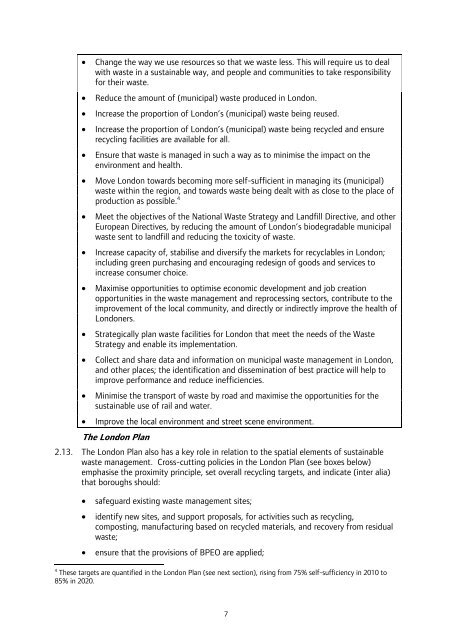London Wider Waste Strategy - London - Greater London Authority
London Wider Waste Strategy - London - Greater London Authority
London Wider Waste Strategy - London - Greater London Authority
You also want an ePaper? Increase the reach of your titles
YUMPU automatically turns print PDFs into web optimized ePapers that Google loves.
• Change the way we use resources so that we waste less. This will require us to deal<br />
with waste in a sustainable way, and people and communities to take responsibility<br />
for their waste.<br />
• Reduce the amount of (municipal) waste produced in <strong>London</strong>.<br />
• Increase the proportion of <strong>London</strong>’s (municipal) waste being reused.<br />
• Increase the proportion of <strong>London</strong>’s (municipal) waste being recycled and ensure<br />
recycling facilities are available for all.<br />
• Ensure that waste is managed in such a way as to minimise the impact on the<br />
environment and health.<br />
• Move <strong>London</strong> towards becoming more self-sufficient in managing its (municipal)<br />
waste within the region, and towards waste being dealt with as close to the place of<br />
production as possible. 4<br />
• Meet the objectives of the National <strong>Waste</strong> <strong>Strategy</strong> and Landfill Directive, and other<br />
European Directives, by reducing the amount of <strong>London</strong>’s biodegradable municipal<br />
waste sent to landfill and reducing the toxicity of waste.<br />
• Increase capacity of, stabilise and diversify the markets for recyclables in <strong>London</strong>;<br />
including green purchasing and encouraging redesign of goods and services to<br />
increase consumer choice.<br />
• Maximise opportunities to optimise economic development and job creation<br />
opportunities in the waste management and reprocessing sectors, contribute to the<br />
improvement of the local community, and directly or indirectly improve the health of<br />
<strong>London</strong>ers.<br />
• Strategically plan waste facilities for <strong>London</strong> that meet the needs of the <strong>Waste</strong><br />
<strong>Strategy</strong> and enable its implementation.<br />
• Collect and share data and information on municipal waste management in <strong>London</strong>,<br />
and other places; the identification and dissemination of best practice will help to<br />
improve performance and reduce inefficiencies.<br />
• Minimise the transport of waste by road and maximise the opportunities for the<br />
sustainable use of rail and water.<br />
• Improve the local environment and street scene environment.<br />
The <strong>London</strong> Plan<br />
2.13. The <strong>London</strong> Plan also has a key role in relation to the spatial elements of sustainable<br />
waste management. Cross-cutting policies in the <strong>London</strong> Plan (see boxes below)<br />
emphasise the proximity principle, set overall recycling targets, and indicate (inter alia)<br />
that boroughs should:<br />
• safeguard existing waste management sites;<br />
• identify new sites, and support proposals, for activities such as recycling,<br />
composting, manufacturing based on recycled materials, and recovery from residual<br />
waste;<br />
• ensure that the provisions of BPEO are applied;<br />
4 These targets are quantified in the <strong>London</strong> Plan (see next section), rising from 75% self-sufficiency in 2010 to<br />
85% in 2020.<br />
7
















